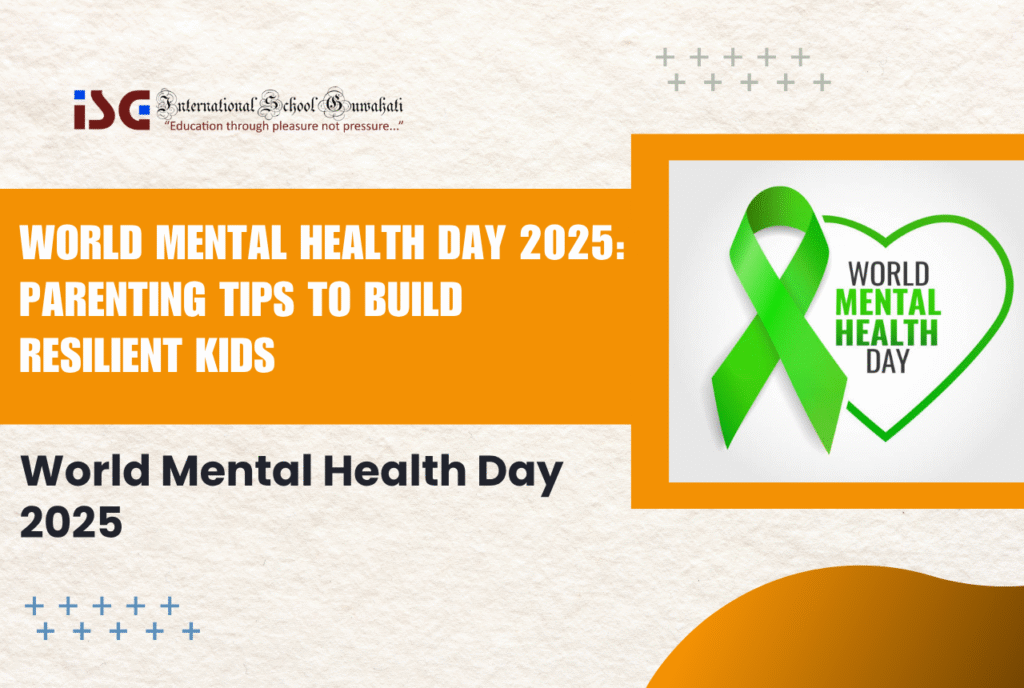World Mental Health Day 2025—also known globally as Mental Health Awareness Day—serves as an important reminder that our mental and emotional well-being is just as important as our physical health. This year, the spotlight shines on a crucial aspect of family life: empowering parents to nurture resilient, confident, and emotionally strong children from an early age.
Children face unique mental and emotional challenges—from academic stress and peer pressure to the constant influence of social media. As these pressures grow, so does the importance of mental health awareness for kids and families.
That’s why this Mental Health Day 2025, we’re focusing on parenting tips to build resilient kids—children who can adapt, cope, and thrive in the face of life’s ups and downs. By teaching emotional intelligence, empathy, and self-confidence, parents can play a life-changing role in shaping their child’s mental well-being and long-term happiness.
What Is Emotional Resilience in Children?
As we celebrate World Mental Health Day 2025, also known as Mental Health Awareness Day, it’s essential to recognize one of the fundamental foundations of a child’s mental well-being—emotional resilience.
Emotional resilience is the ability to recover from setbacks, adapt to challenges, and manage difficult emotions with strength and positivity. For children, resilience is what helps them manage stress, develop empathy, and stay optimistic even during tough times. It’s a key skill every parent should nurture, especially as global discussions around Mental Health Day highlight the importance of early emotional education.
When children are emotionally resilient, they are better equipped to:
- Stay calm and focused during challenges.
- Build self-confidence through problem-solving
- Understand and regulate their emotions effectively
- Develop healthy coping skills to manage stress and disappointment
Parenting Tips to Build Resilient Kids
Helping children develop emotional resilience is one of the most powerful ways to support their long-term mental well-being. As we observe World Mental Health Day 2025, here are five evidence-based parenting tips to nurture confidence, empathy, and strength in your child—ensuring they grow into emotionally healthy and resilient adults.
1. Encourage Open Conversations
A cornerstone of positive parenting is communication. Create a safe, supportive emotional space at home where your children feel comfortable expressing their feelings, fears, and thoughts without fear of criticism or punishment.
2. Teach Problem-Solving Skills
As part of this mental health awareness day, remember: children learn resilience by facing challenges, not avoiding them. Instead of solving every problem for your child, guide them to find solutions on their own.
3. Model Healthy Coping Mechanisms
Children learn by example. The way you handle stress directly shapes how your kids will manage their emotions. Demonstrate healthy coping skills such as deep breathing, mindfulness, journaling, or going for a walk when overwhelmed.
By showing calmness during stressful moments, you teach your children that emotions are manageable—not something to fear. This habit promotes family mental health and emotional balance.
4. Celebrate Effort, Not Just Success
One of the most impactful lessons in building resilience is teaching kids that effort matters more than perfection. Instead of focusing solely on grades or achievements, praise their hard work, creativity, and persistence.
5. Maintain Routines and Boundaries
Consistency is key to a child’s sense of security. Establish healthy routines for meals, schoolwork, screen time, and bedtime. Predictable structure helps children feel safe, calm, and in control—essential elements for emotional stability and good mental health.
Set gentle but firm boundaries that teach responsibility and balance. As you celebrate Mental Health Day 2025, remember that structure and predictability create the foundation for resilience and overall well-being.
Supporting Your Child’s Mental Health on World Mental Health Day 2025
World Mental Health Day 2025, also known as Mental Health Awareness Day, is the ideal opportunity for parents to prioritize open and honest conversations about feelings and emotional well-being. Use this mental health day as a meaningful opportunity to strengthen your child’s emotional resilience and create lasting family connections.
Encourage your child to express how they feel—both the good and the difficult emotions—without judgment. Participate in school mental health awareness programs, read children’s storybooks about emotions, or practice family mindfulness and relaxation activities together. These small, consistent actions promote mental wellness, empathy, and self-awareness in kids.
By actively engaging in Mental Health Day 2025 initiatives, parents send a powerful message: emotional well-being matters. Talking openly about mental health at home helps children develop confidence, compassion, and coping skills that last a lifetime.
Conclusion
As we celebrate World Mental Health Day 2025, also known as Mental Health Awareness Day, let’s take a collective step toward raising mentally strong, emotionally balanced, and resilient children who can face life’s challenges with courage and confidence.
This Mental Health Day, parents everywhere are reminded that small, consistent actions at home—such as listening with empathy, encouraging open communication, and teaching problem-solving—can have a lifelong impact on a child’s emotional well-being. By modeling calmness, compassion, and healthy coping skills, parents become the foundation of their child’s mental strength and emotional resilience.
Let World Mental Health Day 2025 inspire every family to make mental wellness a daily priority. Together, through positive parenting and mental health awareness, we can shape a future generation that is not only intelligent and capable but also kind, confident, and emotionally secure.








